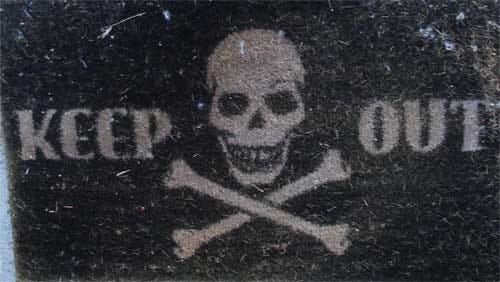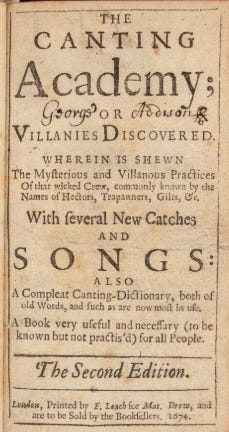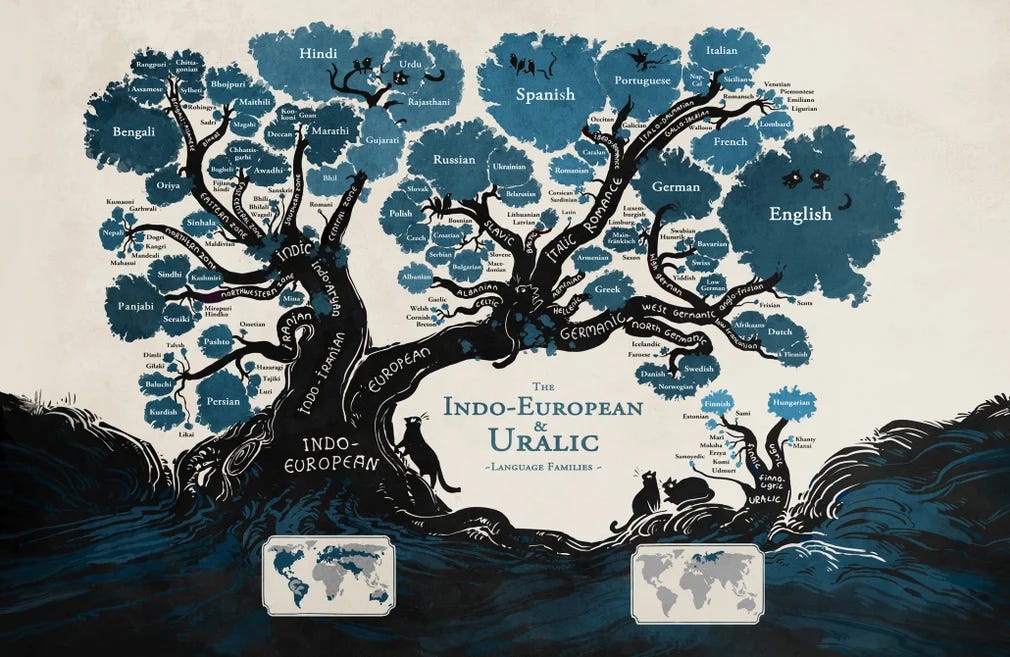I have had a couple of run-ins on Bluesky of late. (Just a couple, I know, I’m lucky, and nothing that qualifies as nasty but I use the app to inform rather than to argue, and to promote what I admire rather than waste time wrangling. Or maybe, I accept, I’m just a coward). The essence of both was linguistic exclusion. These are not your words, said the signs, keep out and stay out.1 Given my work, such a signpost demands trespass. Even for a cowardy-custard like me, some fences need climbing.
The first, a few months back came when there appeared a picture of a roast chicken (maybe with noodles). Looked pretty tasty. The caption: ‘Tory food’. Slang beckoned and I asked the skeeter ‘Why “Tory”?’ The reply was, as I recall, ‘Not everyone needs to know everything on line. This is not your business.’ Believing that it was not perhaps my business but was undoubtedly my job, I pondered further. Given the writer, their politics never hidden, my assumption was that this tasty-looking chicken, likely cooked with care and imagination, was in some way ‘upper-class’ and as such worthy of disdain from those self-described as ‘the real people’. What, I’ll call it ‘the people’s chicken’, might have been I have no idea. Maybe KFC or some such. If that makes me snobbish, tell me I’m wrong. I asked again, thereafter only silence.2
More recently I fell foul of another skeet, this one advocating the ideological hedging of specific vocabularies. This was not class struggle, but a variation on the ‘cultural appropriation’ riff. My response was to voice my problem with what I see as voluntary self-segregation. A multiplicity of group lexes, all fenced about by identity politics and the ukases that, if I read it right, would have to be marshalled and listed to lay down what we are allowed or forbidden to speak. I asked whether I should be marking my dictionary headwords ‘for gay / African-American / Jewish use (the sticking point was non-Jewish use of Yiddish) only’. I was duly reprimanded: I failed to understand the ‘real world’, I was, this is apparently bad, a ‘disinterested descriptivist’.3
Damn fucking right I am. Damn. Fucking. Right. I shall go to my fast-approaching grave (the crem, to be honest, though I have yet to work out the scattering - I’d like a library but do they need more dust?) with my dictionary untainted. Prescription, lit. or fig., is not a word therein.
But how else can useful lexicography exist? What is its purpose if not to offer the best truths that its researchers can assemble. We are neither social workers nor rulers of permitted use of those terms we catalogue.4 We do not do trigger warnings. I wrote this of my fellow descriptivists in Odd Job Man (2014):
Disinterested, unmoved, we are heartless; we have no human interest. Nor human interest stories. Just words, words, words. The beggar is whipped, the whore has a back-story, the junkie dies. We do not care. Only if frustratingly, impudently, they remain mute. We neither prescribe nor proscribe. We describe. The guilty appeasement of political correctness holds no sway. We lay out the stall. It is up to the buyer to assess what they desire. We do not suggest, we do not advise.
Nor do we penalise them for walking on by.
A dictionary that like a know-it-all doctor, stethoscope, pin-striped suiting and self-confidence to the fore, offered only words labelled ‘This will do you good’, would be an abomination.5 As for ‘disinterested’, I have notched up enough years to see that nothing changes and espousing a succession of new belief systems will only see it replaced or perverted. Yes, those same years once seemed to be boding well for my generation, but the tide is rolling back and if I was lucky enough to be born when the defeat of the furthest right was still recent, I shall die when its renewed successors are dancing in triumph on liberalism’s grave.
I am sorry, or it appears I should be and what a weasel word that ‘sorry’ can be, but the making of (slang) dictionaries is not here to comfort the afflicted. Need I intone what may stand as a personal motto (pace its coiner, Lenny Bruce): Everyone wants what should be but there is no ‘should be’, only what is. In dictionary terms that means we do our best to list and explain what people say and write, ‘good’ or ‘bad’ as it may be. Richard Chenevix-Trench, one of the pioneers of the OED noted the importance of descriptivism for what would become the nation’s word-hoard, and those who gave life to his creation took proper note. In other words: tell it like it is. The afflicted may be wholly deserving, but this is the wrong door to hope for alms. I am told by a fellow expert in the craft, ‘It’s not about the people saying it, it’s about the people being hurt by it.’ Setting aside the sense that this comment appears to have elided the subset of slang insults with the multitude of marginalities whose lexes are (as far as I can) listed in GDoS, such is life. Look at the world. Look at it as it is, at days long past, even conjure a possible future. ‘Only man is vile’ indeed, and trust me, that is the most generic use of ‘man’.
As for slang, that much-despised vocabulary, only reluctantly accepted and that quite recently, what else can its dictionaries do. Slang is humanity at its most human. And ‘human’ does not mean kind or compassionate or any synonym thereof. Would another weaselly ‘sorry’ help? I once thought that it might be amusing to mark as ‘derog[atory]’ every word that qualified as such. (I do use that notation at times, but only in the context of racism). There would have been little left, but is that really what the segregationists desire?
What is now known as slang started off as cultural appropriation. Listing the language of itinerant thieves and crooked pedlars self-styled the ‘canting crew’ (cant being the name of criminal jargon, it came from a term for the sing-song - Latin cantare, to sing - delivery of the mass by ill-educated priests). There was a lot of emergent lexicography about - specialist lists pertaining to archery, cooking, animal husbandry, whatever - but, again ‘man is vile’ and not unhappy to be so and the criminal stuff was ever the ‘sexiest’. Titillation, voyeurism, the conferring of apparent authenticity on otherwise dubious tales or (in)famous last words. . . money to be made. The ‘innocent’ words would feed into the emergent dictionaries of standard English, the ‘wicked’ into their slang-based equivalents.
The pro-prescriptivism theory is that words give power and that only those to whom they ‘belong’ should be permitted their use. That grabbing hold of someone’s else’s word and worse yet, using it in speech or writing, removes the group’s power and is categorised as punishable sin. Sounds like segregation to me. Or should the word be ‘ghetto’ (and not in slang’s definition6). To return to the suggestion that we must heed the pain of those who are hurt by such appropriations, does that well-intentioned pussyfooting extend to forbidding that such a word even exist. Nor, looking through the examples I have gathered, have I found much (any) sign of complaint. Mockery, perhaps, of some hapless wannabe, but whining, no. But of course I may have looked in the wrong places.

F-words, c—words, p-words and n-words all exist but they are not spoken thus, merely used as euphemisms in written texts, and those who might be be persuaded to use such obvious bowdlerizations as substitutes most likely never used the full-out versions in the first place.7 Like the 18th century essayist Thomas Brown who created the use of initials and dashes so as to disguise (but not too well) those whom he targeted for abuse in print, all those suffixes do is focus the bright light of sniggering attention. Next stop Hemingway, and the absurdity of his ‘I this and that in the this and that of thy father. I this and that and that in thy this.’8
But let us give the pure in heart a run. Let them set out to segregate the kosher from the treyf. Now tell me, how would they set about establishing their include/exclude vocabularies. How would they police them? Will the next step be the use of an authorized language such as Orwell’s Newspeak, or the specialised, tyranny-driven successor to ‘Lingua Tertii Imperii’ which was what the German scholar Victor Klemperer, amassing it in real time, called the ‘Language of the Third Reich’. Come what may, trying to orient yourself would be such a kaleidoscope, one minute you’re on the inside of your little wall, the good guys with all flags a-flying, using your micro-lexis and forbidding it to others; but then, in the outer, vaster world, the pattern has shaken up, you find the case has altered, and now you are ‘bad’ in so many others’ belief systems. As for policing, are we back with 19th century nanny: ‘rinse out her mouth with soap and water’, or maybe the Medieval executioner: ‘off with his tongue!’ Punishment fitting the crime as W.S. Gilbert’s Mikado sang.9
In any case, language is a mongrel, none more so than English, and the vast majority of slang comes from standard English terms. (I too am a mongrel and unlike much else I see in the mirror, proud to be so.) Some of slang’s own etymologies may remain challenging, and I am no linguist, but look at those that inform the standard lexis and thus, one level down (I bow momentarily to slang’s image), of the slang that plays with them: Sanskrit, Greek, Latin, all the Roman dialects that give us French, Italian, Spanish and other ‘romance languages’, the Germanic and Slavic ones, the huge range of Indo-European roots, among the decendants being early slang’s use of the travellers’ tongue Romani, Hebrew or at least Yiddish, and so many more. Are we to take some linguistic scalpel, pare every term into its original slivers and say, no we cannot use this, so doing might have hurt the original users? I only slightly jest.
Surely the beauty of language - standard and slang - is in its mixing and the creation of something new. African-American influence on popular culture meant that Black slang explodes into the world around World War I and has been dominant since the one that follows. If it is used, however gauche and ill-informed perhaps that use may be, by the wider (whiter) world this is a tribute not an insult. Look at the UK’s Multicultural London English. That fluid blend of cockney, Jamaican patois, the languages of African arrivals, of hip-hop and even standard English. Are the young to be deprived of that admirable and, might I hope, unifying creation? Or, looking further away, must we forbeit borrowing from the infinite richness of Antipodean coinages? Pull out mate, ferchrissake, the dogs are pissing on yer swag.
I have little Yiddish, my parents spoke what they had picked up at home where all my immigrant grandparents would have started lives with it as their primary tongue, but am I rendered fearful if I hear a member of the uncircumcised use ‘goy’ or ‘shlemiel’, ‘meshuga’ or kindred words.10 Forget me, I’m assimilated, but do the ultra-orthodox Haredim, so much nearer to God, bother. Why do I doubt it. And did it matter to my great-aunts and -uncles, kneeling next to the burial pit they had just been forced to dig, if the einsatzkommando mocked them in ill-pronounced Yiddish?
Just look at a dictionary ‘on historical principles’ (the ones with usage examples). You can watch as citation follows citation the way the initial use, like a stone dropped into a village pond, expands its ripples wider and wider still until pond transmogrifies to sea. Not every word, but a good many. Again, I say, this is not insult, this is not hurtful, this is admiration and if there is a sin, then it is jealousy.
I know, dictionaries are not the entirety of life, though some of their makers try very hard to hunt down the entirety of a vocabulary. Nor is everyone, like me, from recent immigrant stock and thus in favour of a cultural ‘melting pot’. I am, see the food comments but in my distaste for identity politics too, judged as ‘privileged’ and thus unqualifed to comment in the first place. And of course I am old. Times have changed, the liberalism we celebrated sneered down as ‘OK boomer.’ In other words, I do not understand. Perhaps not, but I am cynical too (I was cynical long since and nothing I know has convinced me otherwise). I see humanity as unchanging, and tinkering with the niceties as optimistic but ineffective. No, not everyone is wicked, but most have it them and certainly those who rise, scum-like, to the top. What was it a Washington journo once told us: ‘No one who does what you have to do to become President should be allowed anywhere near the job.’ Are you telling me he was wrong.
I love words, more perhaps than I do most of those who speak them. But their plenitude does not confer power.
In October 1961 Peter Cook, of Beyond the Fringe, the hit Oxbridge review that turned into the launch vehicle for London’s contemporary ‘satire boom’, set up The Establishment, a satirical comedy club. To those who asked he explained that it was modeled after ‘those wonderful Berlin cabarets which did so much to stop the rise of Hitler and prevent the outbreak of the Second World War.’
There is only what is. Would that it were better.
thinking about it, my alleged failure to meet some other-mandated standard of socio-linguistic qualification is not new: the current UK Foreign Secretary informed me, on some lost TV show, that my accent being what it is - and what it is is hardly uber-toff - I should not be allowed to do the job I do.
Call me fuck-knows-what, but this link of class, of ‘real’ people to a contempt for well-cooked ingredients and tasty dishes, seems to be an English thing. It is not so in Europe, or not the bits I know. The idea is that if you can, you eat good stuff. And of course, no, some cannot. But that does not render them morally or culturally ‘better’. The fruit and veg-erie that I use every day is neither posh nor prole. It has good stuff and a diversity of customers. Run by North Africans it is used by niquab-ed ladies and those in pearls, by blacks and browns and whites. By immigrant me. True, the local bio shop has the inevitable bobo (bourgeois bohemiens, think champagne socialists) clientele and prices to match, but I know which I prefer. NB: the skeeter was wrong to label creatively cooked food as ‘Tory’. Foodies are much more likely to vote soft left and unless boarding schools have changed, then the food, imprinted for life on the upper-class pupils’ tastebuds, is anything but appealing.
I was further upbraided for ‘showing off’, in that I showed an entry from GDoS. Really, that wasn’t the aim. It was to offer an example of a given word (the Yiddish goy, a non Jew) that had often been used with no apparent problems by… goyim). I resisted using shiksa, a gentile girl and ultimately from Hebrew sheques, a blemish, and thence as it were, a scrubber or slut. My mother, no weak-kneed liberal she and perhaps taking it all too literally, used the word to rename each and every charlady she ever employed.
Certain American lexicons promote themselves as doing just that. When an enormous hoo-ha accompaned the publication in 1961 of the Third Edition of Webster’s International, which unlike the Second (1937) eschewed such law-laying, the American Heritage Dictionary, first published in 1969 and very happy to tell users what’s what, was launched as a direct response.
on that premise too were the world-famous efforts by Samuel Johnson (1755) and Noah Webster (1828). Neither man a shrinking violet, and neither remotely ‘disinterested’, they defined what they saw as ‘important’ words along their own beliefs. For the former, it was all about religion, Christianity of course, and making his work a channel for moral instruction and thence an enforcer of the political and cultural status quo. Insubordination, dissent, subversion — everything that offers to destabilise verbal meanings and social values - were excluded. Webster echoed Johnson, though in other directions: freedom, other than in subjection to divine laws, was absurd; it is defined as ‘violation of the rules of decorum’ and ‘license’. Equality was out of the question and Webster stood foursquare against universal male suffrage. A Democrat was ‘a person who attempts an undue opposition or influence over government by means of private clubs, secret intrigues or by public popular meetings which are extraneous to the Constitution’, while a Republican, on the other hand, was ‘[a] friend of our representative Governments...’ As for love, ‘the love of God is the first duty of man.’ Laws existed simply to ‘enjoin the duties of piety and morality.’
see https://greensdictofslang.com/entry/w6tlygi
the formula has long moved on beyond the first use I can find, the ‘n-word’ dated 1988. Obscenities aside I find B- (bitch), M- (murder or mother), A- (AIDS), K- (kaffir), D- (discretion), F- (fag) and L- (leukaemia). Dilution, as we know, only weakens. Meanwhile, are those who revel in such insults about to down their weaponry at the behest of a few whingeing poshos? It would be a first and my breath remains unheld.
For Whom the Bell Tolls (1940). ‘Papa’ was trying to represent Spanish peasant obscenties.
and boy, would that one have got whacked for cultural a. today.
in his Discworld saga, Terry Pratchett chose to give his golems (first found in Czech Jewish mythology) Yiddish names: in the list compiled at https://discworld.fandom.com/wiki/Golems they include Bobkes = a small or trivial thing, both beneath notice and possibly somewhat distasteful, Dybbuk: evil spirit, demon; Dorfl; idiot, bumpkin, holy innocent; Meshugah: crazy or insane, Kvetch: argumentative, complainer; Nudnik: worthless or inconsequential person; Schmatter: cloth material, tailored fabric and Shtetl: settlement, ghetto. I remain delighted by Pratchett’s conceit.





Could be, could be. Looked tasty whatever.
This has pushed many writers into hardly writing at all; I left all social media because of it, and I find other reasons not to write. I appreciate you marking the usage of language as a historian first. One of the first books I read was Leo Rosten’s The Joys of Yiddish, cover to cover.